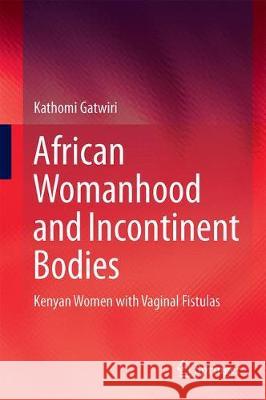African Womanhood and Incontinent Bodies: Kenyan Women with Vaginal Fistulas » książka
topmenu
African Womanhood and Incontinent Bodies: Kenyan Women with Vaginal Fistulas
ISBN-13: 9789811305641 / Angielski / Twarda / 2018 / 210 str.
African Womanhood and Incontinent Bodies: Kenyan Women with Vaginal Fistulas
ISBN-13: 9789811305641 / Angielski / Twarda / 2018 / 210 str.
cena 194,52 zł
(netto: 185,26 VAT: 5%)
Najniższa cena z 30 dni: 192,74 zł
(netto: 185,26 VAT: 5%)
Najniższa cena z 30 dni: 192,74 zł
Termin realizacji zamówienia:
ok. 20 dni roboczych.
ok. 20 dni roboczych.
Darmowa dostawa!
Kenyan Women with Vaginal Fistulas











